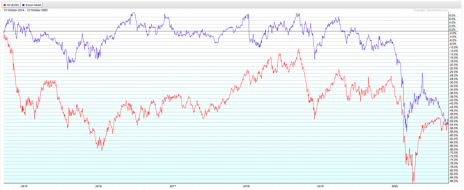Six years ago, Exxon (XOM) was one of the richest companies on Wall Street, with a $445 billion market cap and a share price north of 100. Then, oil prices started to nosedive, falling from roughly $115 a barrel at their summer 2014 apex, to $36 a barrel by early 2016. Today, oil prices aren’t much higher, at $40 a barrel. And XOM stock has never recovered.
Here is a six-year chart that shows the tandem downward spirals in West Texas crude oil prices (red line) and Exxon stock (blue line):
For years, XOM stock was at least achieving equilibrium, trading roughly flat for almost five years despite oil prices consistently being in the dumps. But COVID-19 was the final blow, sending Exxon shares spiraling down 50% this year as earnings went negative for the first time in decades, and sales are expected to decline by more than a third.
[text_ad use_post='129632']
Of course, XOM stock isn’t alone in its cratering this year. Energy stocks as a group are down more than 48% year to date. But no big oil stock has taken it on the chin the way Exxon has.
Here are the losses the five biggest U.S. energy stocks by market cap have suffered this year:
Exxon (XOM): -50%
Chevron (CVX): -38%
ConocoPhillips (COP): -46%
Enterprise Products Partners (EPD): -38%
Kinder Morgan (KMI): -40%
Yuck. No winners there. But the biggest loser has been Exxon. And that’s nothing new.
XOM Stock Underperforming for Years
According to FactSet, XOM stock has underperformed CVX, the next-largest U.S.-based big oil company by market cap, by 36% since January 1, 2016. During that time, XOM has trailed the S&P 500 in relative performance by 125%.
It’s no mystery why. Exxon’s sales have fallen 39% since their 2013 peak, while profits have been cut by more than half. In essence, Exxon is synonymous with big oil; and as the oil industry has taken a beating in recent years, Exxon’s standing in the global marketplace has greatly receded.
Is there any hope in sight for Exxon Mobil? Not if you expect the company to return to its pre-oil price crash glory days. The world is moving away from oil, not towards it. No, oil isn’t on the brink of extinction; I’m sure oil prices will bounce back, perhaps even approach $100 someday when this global pandemic is finally in the rearview mirror. Even so, Exxon will not reclaim its perch as one of the five most valuable properties on the stock market, alongside mega-cap tech stocks like Apple (AAPL), Amazon (AMZN) and Google (GOOG).
In the short term, XOM could have some buy-low, turnaround stock value. It does offer a whopping 10% dividend yield. It does trade at a relatively cheap 20 times earnings (though really not that cheap considering the share price has been sliced in half this year). And analysts expect sales and earnings growth to return next year. That said, Exxon will likely never again grow like it did a decade ago, when the company grew sales by an average of 25% a year in 2010-11 and EPS by an average of 45%. The best the company can hope for now is consistent top- and bottom-line growth, year after year.
Personally, I wouldn’t touch it. There are other, smaller stocks in the energy sector that might be worth buying low; our Cabot Dividend Investor advisory, in fact, currently recommends four energy stocks with high yields and/or strong dividend growth. To learn their names, click here.
One thing I can tell you: Exxon stock isn’t one of them. For decades, it was a staple of every investor’s portfolio, a consistent grower in a reliable industry. XOM was probably the first stock your grandparents would give you to help you get started investing.
You won’t be giving XOM stock to your grandkids.
[author_ad]


